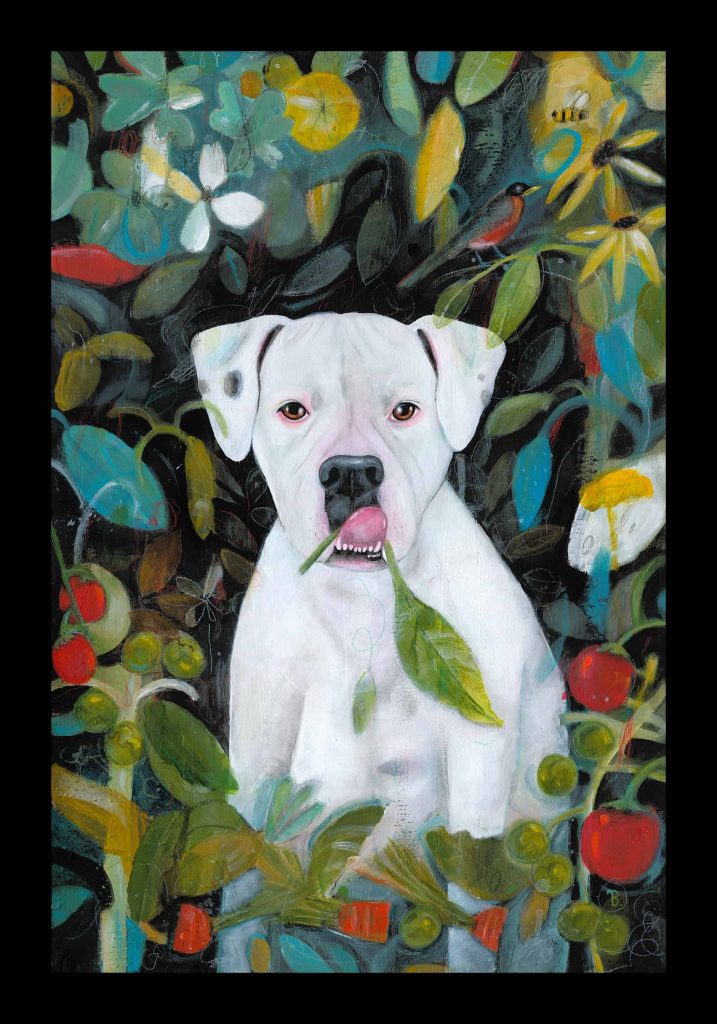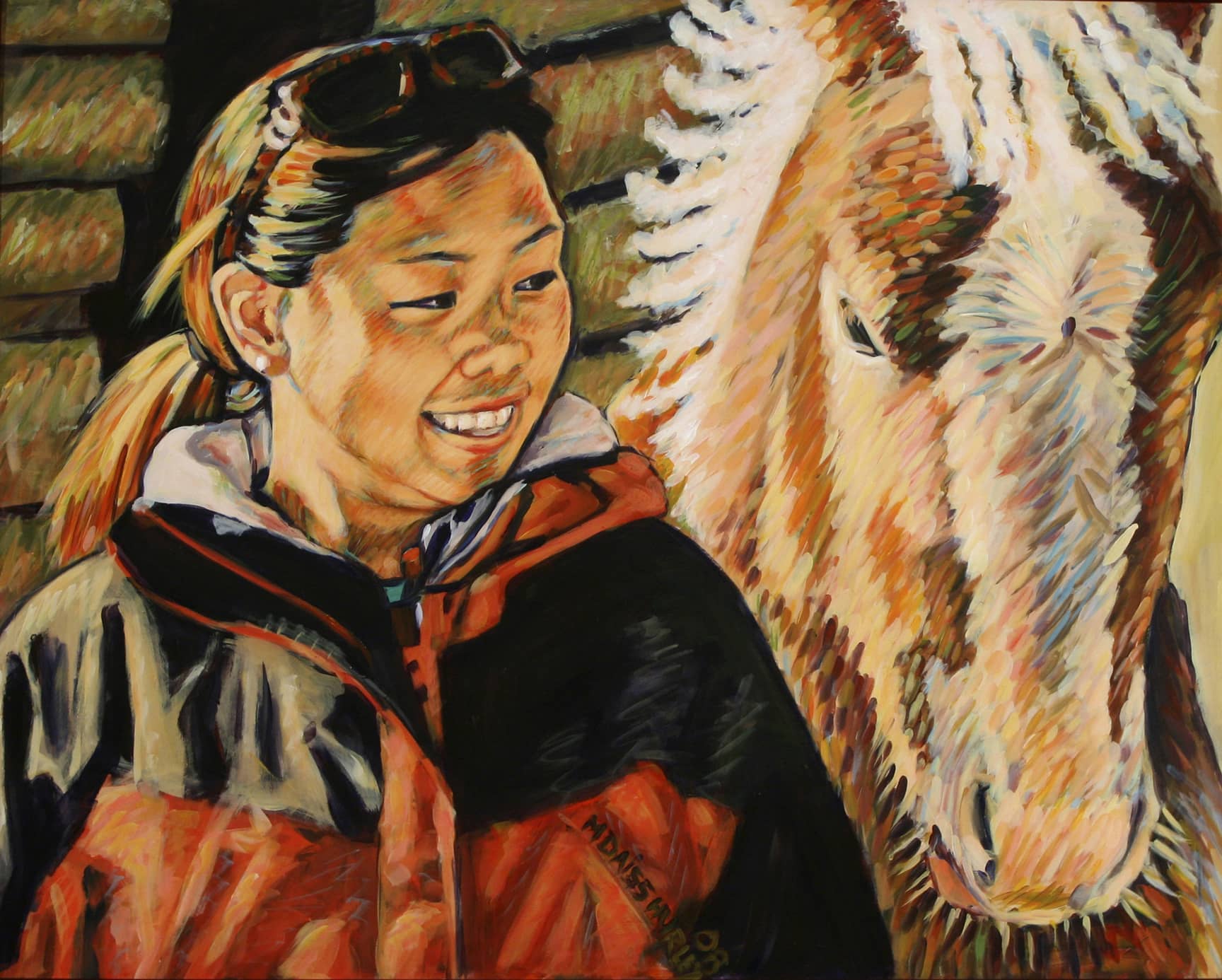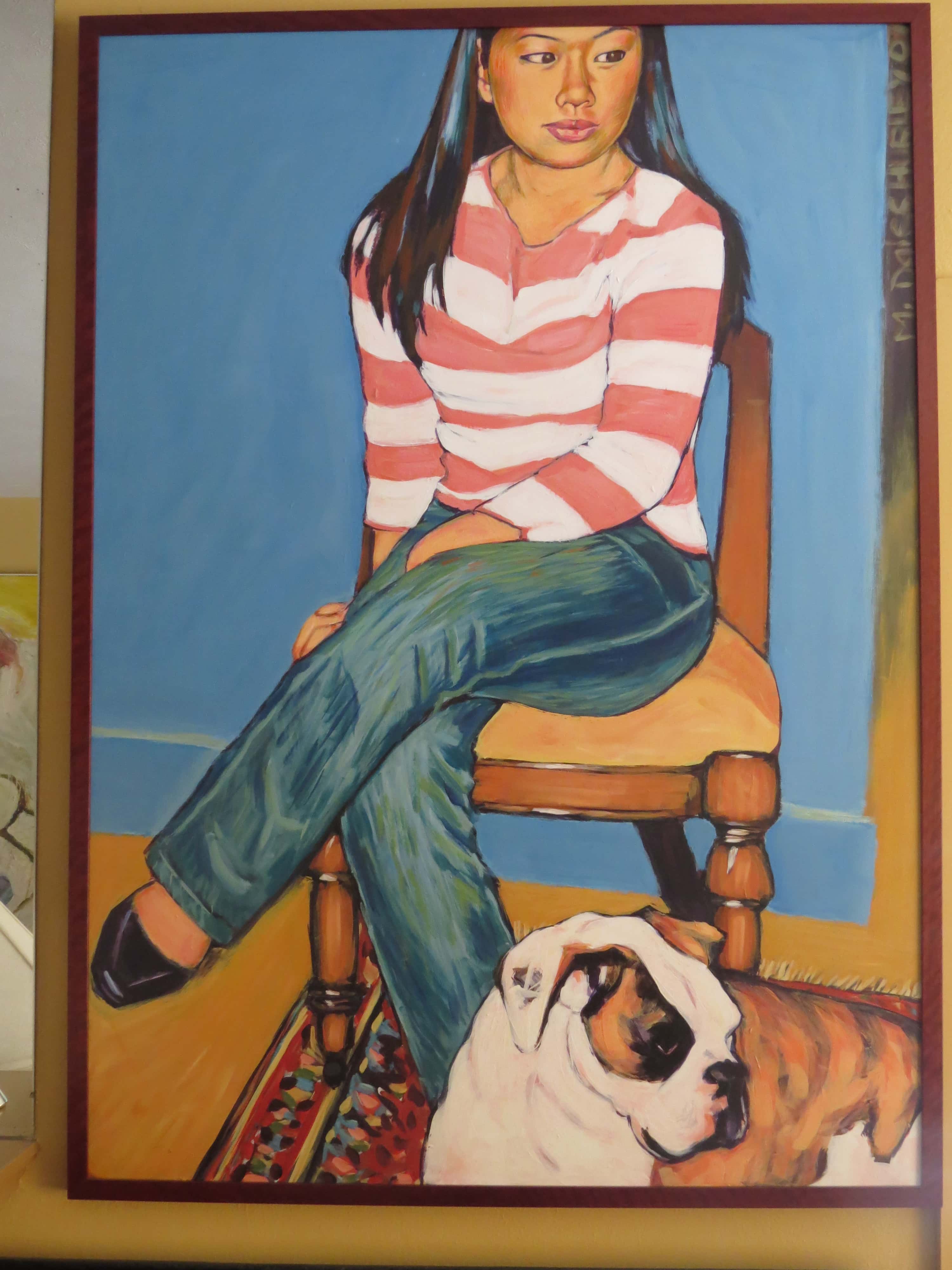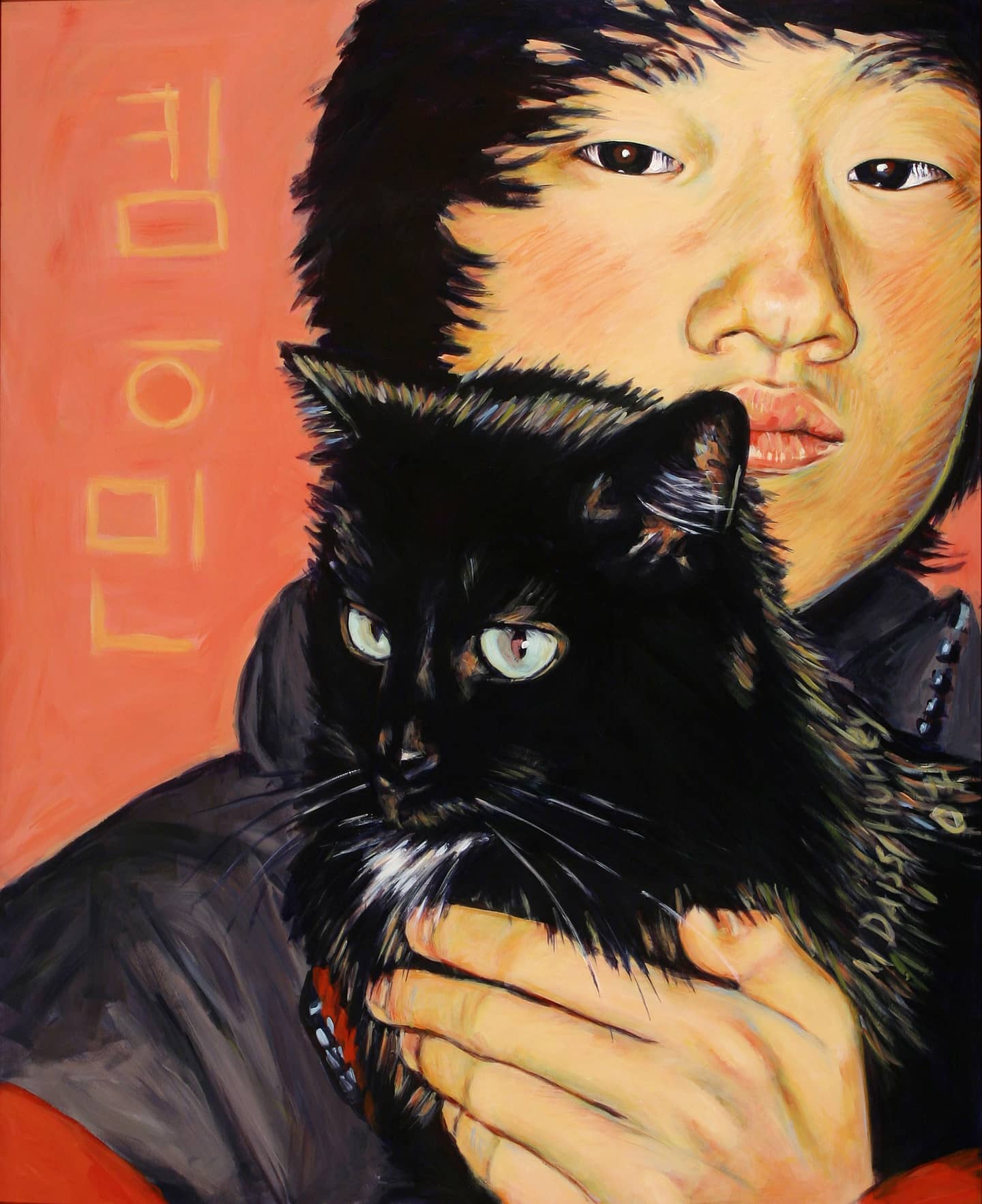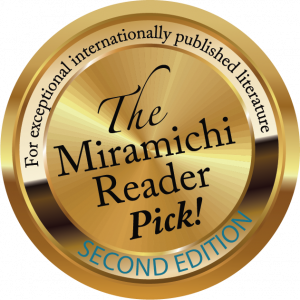
-
Landing pageTHE DOG WHO ATE
THE VEGETABLE GARDEN&
HELPED SAVE THE PLANET
Book Excerpt 1
Book Excerpt 1 – Foreword
My story is about plants. The planet. And animals. About a dog. Me! And my humans. Eating only plants. No animals. Yup! And that brings up other stuff. Um hm.
Meg helped me write this book. Makes me a bit testy. Humans “helping.” Because they take over. Habit of theirs. Controlling the lives. Of others. That’s when they get things wrong! Had to bring her up short. At times.
She’s a pain to work with. Says that of me! Too. Thinks she has me pegged. And get this! Meg puts her words. Into my mouth. And that’s really annoying. But I used what she said. Contrary wise. Here and there to make ALTERNATIVE points. Yessiree! When I sniffed her INCONSISTENCIES. (Hold on. I’ll explain this funny way. Of writing words. Later.) Anyhoo Meg’s mother insists we’re enmeshed. Whatever that means. “Boundary issues, Dori,” Meg says. “Boundary issues.”
Once in awhile I had to protest. Do CIVIL DISOBEDIENCE. I’d lie down. Head between my paws. Close my eyes. And ignore her. I’ll have you know. So writing took longer. Because of my lying around. With my eyes closed. Then we’d get it together.
Tiffs. Stand offs. DISSENT. We made it. To the end. INTER-SPECIES friends. Relating my deeds. And hers. About how she and I try to protect animals. And help the planet. So you can. Too. Understand. When humans eat animals. They damage the world. It’s all connected. Harming animals. To how each of you treats different others. To Earth’s destruction. And VICE VERSA.
Meg says humans can’t tell this story. As well as dogs. Ahem. As well as this dog! We live with you. Watch you. Figure you out. A matter of survival. Um hm. We’re ETHOLOGISTS! Studying humanimals. But a dog can’t go it alone. In the literary world. That’s where Meg came in.
Every word she wrote down. For me. Is the truth. And that’s important. Because if you can’t trust a dog. Then who can you trust? Think about it. Who? My human insists I should say whom. Not who. See! I told you. That stuff slows a dog’s creativity. To a craawl.
Meg says the hard truths. She brings up. And that I had her include. Might twistyourknickers. Humph! I think she meant to say: “twistyourwhiskers!” Yup! Hard truths make a dog radical! And one more thing. Animals are people! Too. Non-human persons entitled to live. Their own lives. To the fullest! Free! From human harm. On a healthy planet.
Wagwagwag,
Dorothea Orane
Book Excerpt 2
Book Excerpt 2
Been turning over. In my mind. The vegetable garden. And what will happen in it. While we’re away. In Vermont. Nooooo vegetable garden. For three weeks. While Meg takes care of her father. And the farmers’ market. In Nancy’s and Bob’s town. Does not allow dogs to accompany their humans. While shopping. Humph.
But I’ll play with Sophie. And maybe the black bear will visit. At night. The baby finches nesting. In the bird feeder. Though. Will be long gone. By the time we arrive. Meg and I will pick blueberries. And raspberries. Take walks down the lane. I’ll chase Williethecat. Maybe. He might be dead. Nancy says he has cancer. Of the jaw. After hearing the DIAGNOSIS she drove. Over a curb.
I hope the doe and her spotted fawns visit the yard. And snack on Nancy’s apples. I’ll bark at them. My friendliest rrrrruff. Maybe I’ll try putting my head. On Bob’s lap. Again. A bit of a risk. Meg will cook vegan meals. Nancy told him. Right in front of us! Mind you. Just before leaving. That while she’s away. If he wants meat. Then he’ll have to go out. For lunch. With his friends. For hotdogs. Ooph! Does Nancy know hotdogs cause cancer? Consider the animals’ suffering?
Anyhoo I’ve never seen a hotdog. Pretty upsetting. People eating dogs. They do that. In Korea. Meg knows. And all through Asia. There the meat markets have piles. Of them. With sad faces. Crammed into stacked metal cages. Peeing and shitting. On one another. Their muzzles taped shut. No food. No water. Dogs watching other dogs die. While waiting. “In EERIE silence,” says Meg, “to be killed.” On a hike. In the mountains. Near Seoul. She saw a man burning fur. Off a dead dog. In the middle. Of the trail. With a blow torch. Before he ate it. Maybe hotdogs look like that! Makes me go all rubbery. And slack.
Book Endorsements
Praise for The Dog Who Ate the Vegetable Garden
Dori’s story is generous and fearless and deeply ethical.
Jessica Pierce – Bioethicist, author of numerous books,
including Who’s A Good Dog? and A Dog’s World, contributor to Psychology Today on human-animal relationships.
Faculty Affiliate with the Center for Bioethics and Humanities, University of Colorado Anschutz Medical Campus
A gorgeous story of rich love and zany adventures that made me look deeper within to find more kindness and more hope for a better world.
Dotsie Bausch – Founder, Switch4Good, Olympic Medalist, World Record Holder
Meg and Dori (a real dog) created perfection in this book! I absolutely love Dori’s point of view and how intuitively Meg channeled Dori’s sentiments and disbelief regarding humans. The Dog Who Ate the Vegetable Garden & Helped Save the Planet is the stuff that classics are made of, and should be required reading for everyone, including teachers and older students. The perspective is spot on!
Renee King-Sonnen – Executive Director and founder of Rowdy Girl Sanctuary, a former beef cattle ranch that became a farmed-animal sanctuary
An audacious undertaking, to be sure. A fine example of creative writing. Cleverly written. A Miramichi Reader “Pick” for “exceptional internationally published literature.
James M. Fisher – Editor in Chief, The Miramichi Reader
I love, love, love this book! So sad to get to the end and say ‘goodbye’ to Meg and Dori. I cannot recommend enough The Dog Who Ate the Vegetable Garden & Helped Save the Planet.
Kate Galli – Host of the Healthification—Strong Body/Green Planet podcast, personal trainer, vegan health coach
It’s delightful.
Jeff McMahon – Forbes senior contributor on climate change
This is a delightfully witty, whimsical and creative book. And a decidedly serious one. Ooph!
Jonathan Balcombe – author of What a Fish Knows
Dori’s narrative is a heart-touching and zany blend of actual events in the life of a young Boxer. With edgy charm, she takes us on a romp through her world in such a way we can’t help but reconsider our lives. Through her we get a dog’s-eye view on human exploitation of animals. This unique approach is hauntingly effective.
Dr. Will Tuttle – author of the acclaimed Amazon #1 best-seller The World Peace Diet, published in 16 languages, he is a recipient of the Courage of Conscience Award as well as the Empty Cages Prize.
Quirky humor, autobiography, and so much more. Dori held my interest all the way. This is a book of ethics and love, and an act of faith and wisdom on how veganism could save us and lead us to the world’s flowering, again. Dori deepened me. I hope thousands of folks take it to heart and mind.
William Heyen – National Book Award Finalist and author of The Candle: Poems of Our 20th Century Holocausts
A very clever and unique book—unique in more ways than one!
Dr. T. Colin Campbell – author of New York Times best-seller The China Study, Cornell University Jacob Gould Shurman Professor Emeritus of Nutritional Biochemistry, founder T. Colin Campbell Center for Nutrition Studies
There’s a spark inside all dogs that ignites the human heart. One particular dog, the main character in this extremely informative animal-rights cross-genre novel, can light up an entire city. Dori, the story’s pert four-legged sage, helps the reader see the world with compassion. We are all in dire need of her furred truth telling. Folks—this is “real news.” A clever, important and enlightening book, it is necessary and couldn’t have arrived at a better time. Dori can help save lives and the planet. Highly recommended!
Rob Plath – underground poet and author of A Bellyful of Anarchy, The Cataracts of Conformity and many others, painter, photographer, and animal-rights activist.
Dori’s cracking-wise book is a fresh and cheeky view of the world. Reading her very fluidly written pages is a lot of fun. Delightful!
John Sterling – former president Henry Holt/Editor at Large, MacMillan
Author Bio
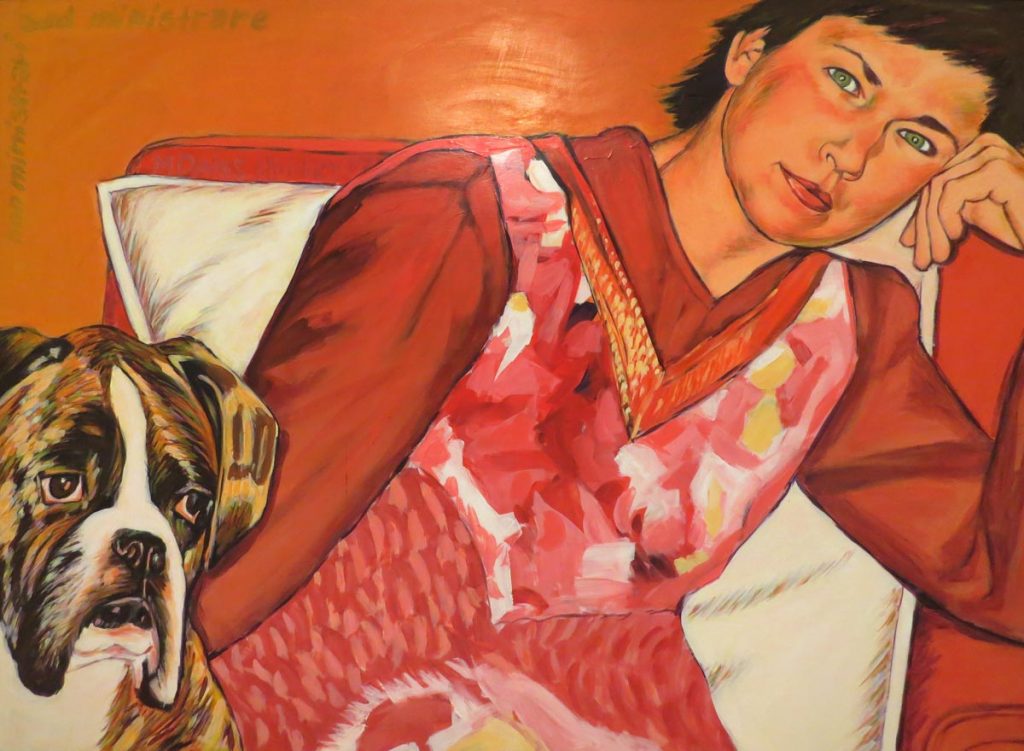
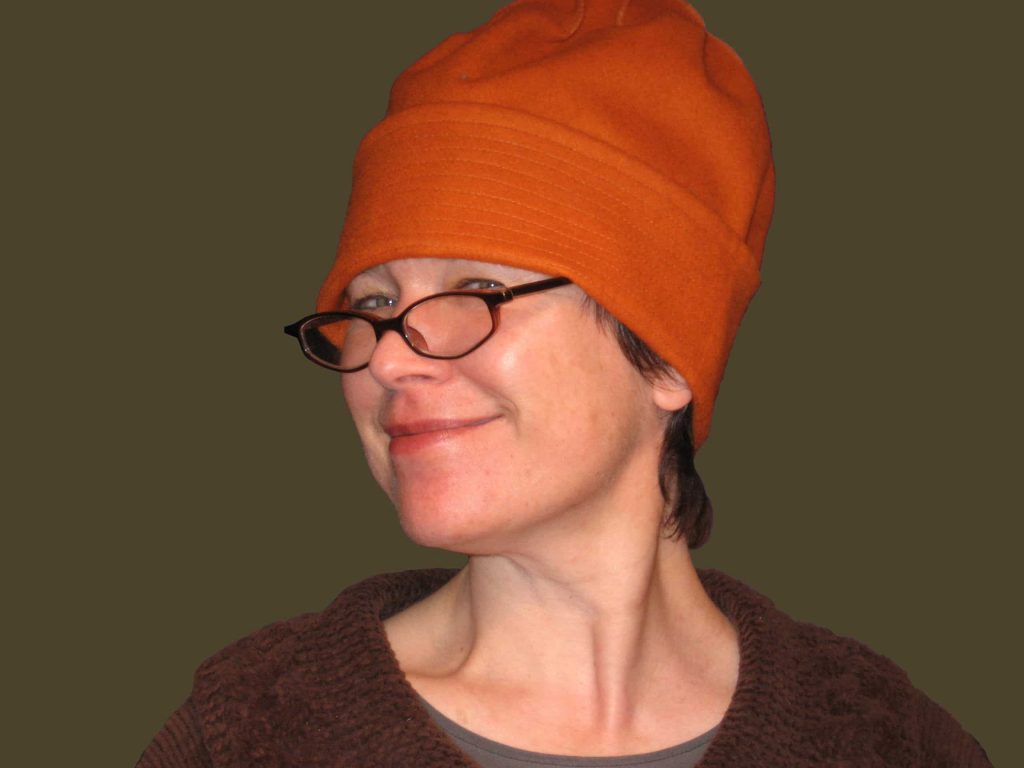 Margaret (Meg) Hurley is an eco-feminist, animal-rights activist and vegan. Daughter of an artist and a serial entrepreneur/inventor, she grew up in Vermont. Her essays have been published in magazines, including Ms. and Mothering, and in U. S. and Korean newspapers. Named “Notable Essayist” in Best American Essays 1995. Her creative nonfiction has been included in anthologies and in the Korean literary journal Gokdongsanae. Grove Atlantic’s former editor Alison Draper nominated her unpublished collection of personal essays for the Pushcart Press Editor’s Book Award. Readings given at Harvard/Radcliffe, Wellesley, and The Maryland Institute College of Art, among other venues. The Heartbeats—front band for Ten Thousand Maniacs and featured on A Prairie Home Companion—opened her creative non-fiction reading in Vermont. Currently available on Amazon Prime, The Hanji Box, an indie film inspired by her personal essay The Poster in Insadong. Over forty of her arts commentaries were aired on NPR affiliate WXXI (Rochester, New York). Former Curator of City Hall (Baltimore, Maryland). Former alternative-progressive high-school English faculty (Rochester, New York). Mother of two grown Korean-born children. Lapsed artist and graduate of Wellesley College, she lives in New Hampshire with her husband (retired attorney), who is an animal-rights activist and vegan, also, and two vegan dogs: Dori (narrator of The Dog Who Ate the Vegetable Garden) and Perle.
Margaret (Meg) Hurley is an eco-feminist, animal-rights activist and vegan. Daughter of an artist and a serial entrepreneur/inventor, she grew up in Vermont. Her essays have been published in magazines, including Ms. and Mothering, and in U. S. and Korean newspapers. Named “Notable Essayist” in Best American Essays 1995. Her creative nonfiction has been included in anthologies and in the Korean literary journal Gokdongsanae. Grove Atlantic’s former editor Alison Draper nominated her unpublished collection of personal essays for the Pushcart Press Editor’s Book Award. Readings given at Harvard/Radcliffe, Wellesley, and The Maryland Institute College of Art, among other venues. The Heartbeats—front band for Ten Thousand Maniacs and featured on A Prairie Home Companion—opened her creative non-fiction reading in Vermont. Currently available on Amazon Prime, The Hanji Box, an indie film inspired by her personal essay The Poster in Insadong. Over forty of her arts commentaries were aired on NPR affiliate WXXI (Rochester, New York). Former Curator of City Hall (Baltimore, Maryland). Former alternative-progressive high-school English faculty (Rochester, New York). Mother of two grown Korean-born children. Lapsed artist and graduate of Wellesley College, she lives in New Hampshire with her husband (retired attorney), who is an animal-rights activist and vegan, also, and two vegan dogs: Dori (narrator of The Dog Who Ate the Vegetable Garden) and Perle.
Publications – partial list:
The Dog Who Ate the Vegetable Garden & Helped Save the Planet (novella) – Guernica Editions (Spring 2019)
The Hanji Box – award-winning international, independent film based on autobiographical essay The Poster in Insadong. Written and directed by award-winning filmmaker Nora Jacobson. (Amazon Prime 2017/VTPBS 2018)
“Emancipate Animals from Bondage” Valley News (May 5, 2013) “Ruby Gold,” – Community Voices in the Gallery (poetry anthology – 2008 University of Rochester Press)
“Debatable Democracy,” The Daily Record (Law journal) – May 2006
“Benign Neglect,” Natural Family Living – An Anthology (Simon & Schuster 2000)
“By My Motherhood,” Gokdongsanae (Korean literary magazine 1999)
“Benign Neglect,” Country Kids Magazine (reprint June/July 1998)
“By My Motherhood,” Yosong Shinmun (Korean feminist newspaper – March 1999)
“Benign Neglect,” Mothering (Winter 1994)
“Cautionary Tales for Working Mothers,” Parents (July 1994)
“You’ll Pass,” Valley News (June 18, 1994)
“Teaching My Daughter to Fight,” Ms. (May/June 1993)
“My Truck,” Hysteria: Women, Humor and Social Change (May 1993)
“Please Write,” Wellesley (Winter 1993)
Works in progress:
thUS — a poetry collection, including “the Challenge”
Saving Grace – Memoir of a Murderer
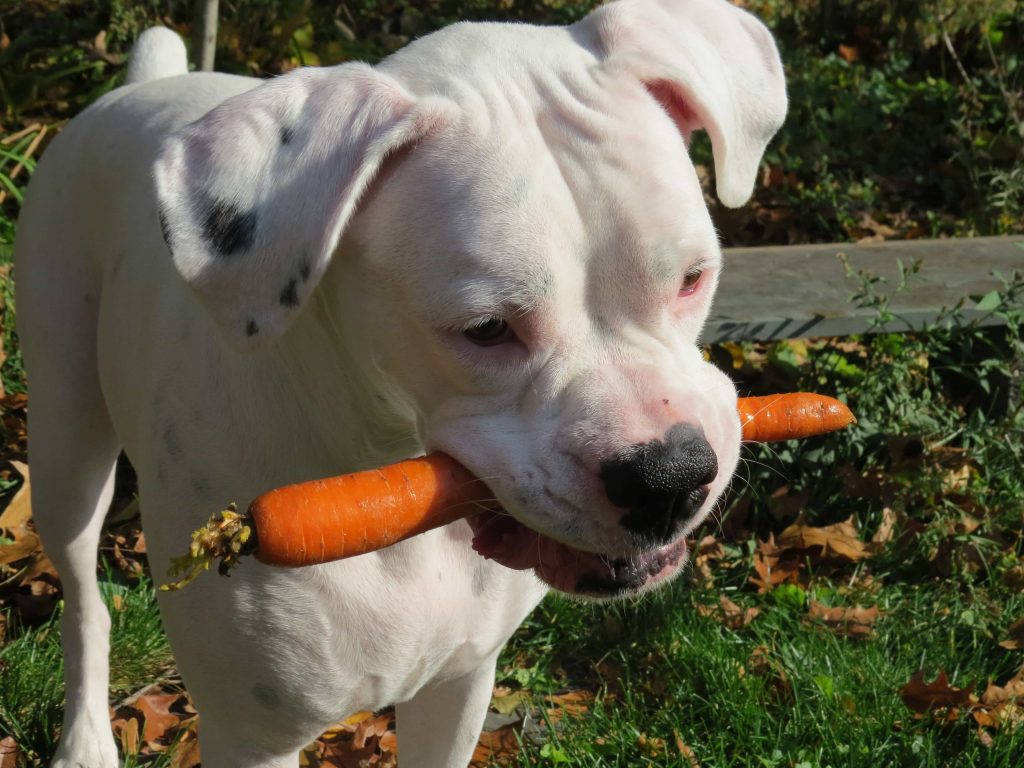 Best friend. Alter ego. Willful. Independent. Mouthy. Dorothea Orane Hurley keeps her human family in line, making them question and assess their relationships with animals. Raw yams, cooked broccoli, blueberry Clif Bars, barbequed tempeh, and nutritional yeast are some of Dori’s favorite foods. Sniffing and snoozing are her pastimes. She hasn’t ransacked anymore vegetable gardens. Every day, she and Perle and their humans go on long walks, unless the weather is unbearable. No more chasing squirrels. Politely, she stands and observes them. This is her first book.
Best friend. Alter ego. Willful. Independent. Mouthy. Dorothea Orane Hurley keeps her human family in line, making them question and assess their relationships with animals. Raw yams, cooked broccoli, blueberry Clif Bars, barbequed tempeh, and nutritional yeast are some of Dori’s favorite foods. Sniffing and snoozing are her pastimes. She hasn’t ransacked anymore vegetable gardens. Every day, she and Perle and their humans go on long walks, unless the weather is unbearable. No more chasing squirrels. Politely, she stands and observes them. This is her first book.
Veganism
VEGANISM
Veganism opposes carnism. Veganism is an ethic of compassion, care, and justice for all— including animals—that extends throughout choices, purchases, attitudes, language, and actions. It is a moral baseline that defies the exploitation of nonhuman animals, humans, and the environment. This ethic does not see humans as more important and deserving than animals, and omits animals and animal-derived substances from diets, entertainment, research, medicine, fashion and other material goods. This ethic embraces animal rights and rejects the commodity status of animals. Vegans eat plant-based diets, which can reverse and cure many deadly and debilitating diseases such as cancer, diabetes, heart disease, arthritis, ED, and atherosclerosis, to name a few.
Veganism’s embrace of animal rights intersects with other justice movements that fight oppression and destruction of humans and the planet. It is now considered the fastest growing social justice movement in history. In 2010, the United Nations called on the entire world to turn to plant-based vegan diets to end hunger and starvation and to save the planet from human-caused Global Warming and its outcome, the Sixth Mass Extinction, into which we have entered and caused foremost by farming and harvesting, annually and unnecessarily, 3 trillion land and water animals as commodities for food and other uses such as medicine and clothing.
CARNISM
Carnism claims, brutally, the lives of trillions of land and water animals, annually. It is non-essential to the majority of people in the world, today, because plant protein for human diets is superior to animal protein. According to psychologist Dr. Melanie Joy’s website www.carnism.org:
Carnism is the invisible belief system, or ideology, that conditions people to eat certain animals. Carnism is essentially the opposite of veganism, as “carn” means “flesh” or “of the flesh” and “ism” refers to a belief system.
Because carnism is invisible, people rarely realize that eating animals is a choice, rather than a given. In meat-eating cultures around the world, people typically don’t think about why they eat certain animals but not others, or why they eat any animals at all. But when eating animals is not a necessity, which is the case for many people in the world today, then it is a choice – and choices always stem from beliefs.
As long as we remain unaware of how carnism impacts us, we will be unable to make our food choices freely – because without awareness, there is no free choice.
Why has carnism not been named until now? One reason is that it is simply easier to recognize those belief systems that fall outside the mainstream (e.g., vegetarianism or veganism).
A much more important reason, though, is that carnism is a dominant belief system: it is so widespread that its principles and practices are considered common sense, “the way things are,” rather than a set of widely held opinions. Carnistic bias is built into the very foundations of society – when we study nutrition, for example, we actually study carnistic nutrition.
And carnism is also a violent belief system: it is organized around intensive, extensive, and unnecessary violence toward animals. Even the production of so-called humane (or, bio) meat, eggs, and dairy – a tiny percentage of the animal foods produced in the world today – exploits animals and involves brutality.
In short, carnism is a system of oppression. It is enabled by an unjust exercise of power that causes unnecessary harm to billions of individuals.
Carnism is a social justice issue. Because [it] is invisible, we assume that eating or not eating animals is simply a matter of personal ethics: “You make your choices, and I’ll make mine.” However, when we recognize carnism, we can appreciate that eating animals is in fact the result of a widespread, oppressive system. (Consider, for example, how believing that women did not deserve the right to vote had less to do with “personal choice” or “personal preference” than it did with the widespread sexism that conditioned people to believe in the inferiority of women.)
And carnism is structured like other systems of oppression, such as racism, sexism, and heterosexism. While the experience of each set of victims of oppressive systems will always be unique, the systems are similar because the mentality that enables the oppression is the same.
Ultimately, cultivating compassion and justice is not simply about changing behaviors; it is about changing consciousness so that no “others,” human or nonhuman, are victims of oppression. To bring about a more compassionate and just society, then, we must strive to include all forms of oppression in our awareness, including carnism.
